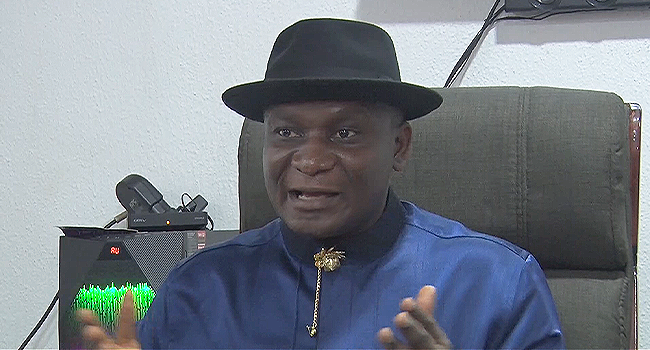
This is just as he said the Niger Delta region is the most affected in Nigeria by issues of climate change.
Speaking in an interview on Arise Television on Sunday, after attending the Climate Change Conference, COP28, in Dubai, the United Arab Emirates, Ogbuku stressed the need for a permanent solution to the environmental challenges faced by the Niger Delta region as a result of crude oil exploration and exploitation.
This was contained in a statement issued in Port Harcourt, Rivers State, by the NDDC Director, Corporate Affairs, Pius Ughakpoteni; a copy of which was obtained by our correspondent.
He stated, “The conference in Dubai gave us the opportunity to highlight our position on the climate change issue and seek partnerships and investments in renewable energy.
“We went there to tell our story as the people of the Niger Delta and to let the world know the impact of crude oil exploration and gas flaring on our environment.”
The NDDC boss underlined the negative impacts of climate change on the inhabitants of Nigeria’s oil basin, including the forceful migration of many communities due to pollution, flooding and environmental degradation.
Ogbuku added, “We believe that the Niger Delta region is the most affected in Nigeria by issues of climate change. The impact of crude oil and gas exploration has eroded our environment and most of our communities have been deserted due to urban migration.”
Reflecting on the gains of the NDDC from the COP28 conference, Ogbuku said, “I believe we achieved a lot of success. We held discussions on partnerships with various organisations, including the National Council of Climate Change, especially in the area of tackling the issue of gas flaring.”
He said that the commission was investing in solar power to light up communities in the Niger Delta region, adding that it was expecting to recover carbon credits from the investments.
Ogbuku gave an insight into the commission’s plans for 2024 and beyond, stating, “We are preparing our 2024 budget and we will capture all these investment plans, which include a massive tree-planting campaign and the training of youths in renewable energy to prepare them for the future.”
In his presentation during an event on the sidelines of the climate summit, Ogbuku said that the commission would train 1,000 youths in the Niger Delta region on the conversion of fuel engines to condensed Natural Gas.
He noted, “About 1,000 youths are to be trained on conversion from fuel to gas engine. We want to make Niger Delta the hub of engine conversion, where we can also be outsourcing to other parts of Nigeria.
“We want to take that bold initiative that is going to engage most of our youths because we also want to be involved in the whole green energy process.”
The MD said that the commission decided to take the challenges and prospects of the Niger Delta region to the global conference to elicit the right actions, noting: “There is the need for us to tell our own story at the global stage.”
Ogbuku observed that there had been discussions on gas flaring, climate change and carbon emissions, over the years with no substantial results.
“We have come to a point where we must take the right actions,” he said.
He further said the interventionist agency through its Environmental Protection and Control Directorate, had established a framework to ensure that all its developmental activities were green energy compliant.













